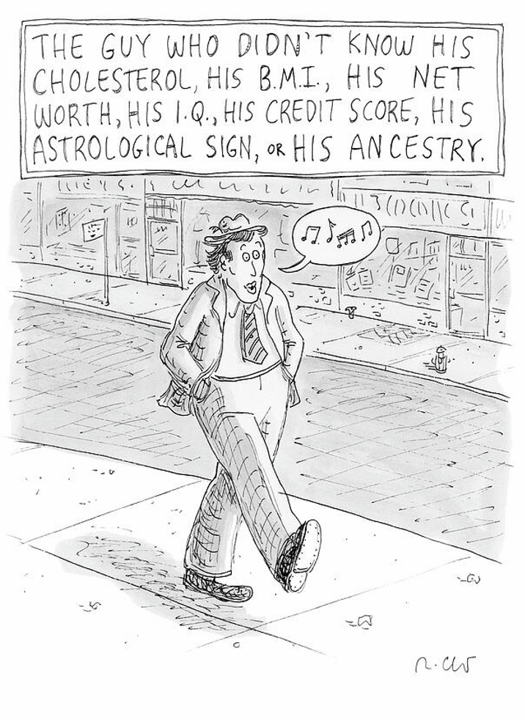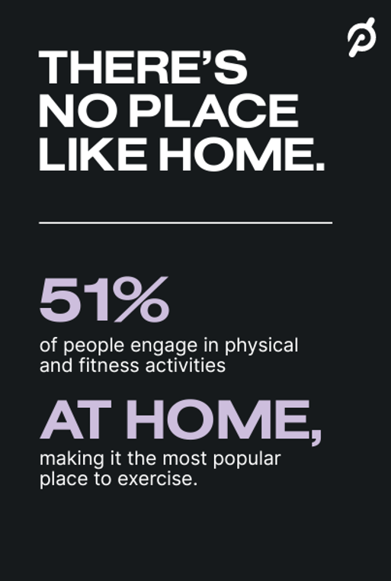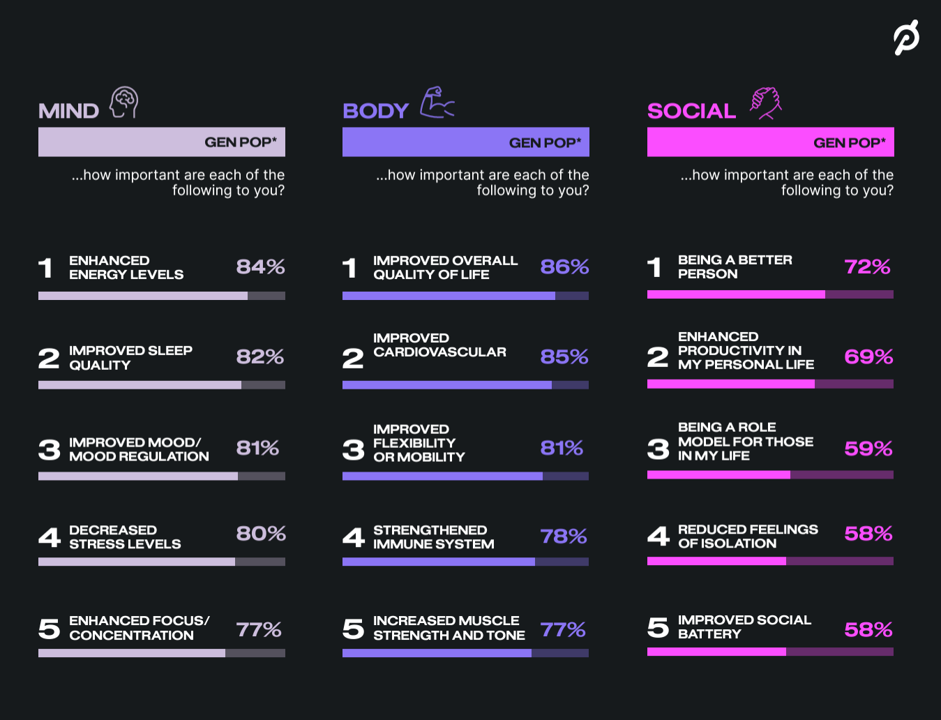How many people do you know that don’t know their cholesterol or their BMI, their net worth or IQ, their credit score, astrological sign, or ancestry pie-chart?
Chances are fewer and fewer as most people have gained access to medical records and lab test results on patient portals, calorie burns on smartwatches, credit scores via monthly credit card payments online, and completing spit tests from that popularly gifted Ancestry DNA test kits received during the holiday season.

Meet “The Guy Who Didn’t Know His Cholesterol” conceived by Roz Chast, the great cartoonist regularly featured in The New Yorker, this one in the magazine’s March 11th, 2024 issue.
I’m gleefully sharing this cartoon with you as context for discussing Peloton’s latest research into U.S. health consumers’ Spring 2024 Wellness Trends published March 27th.
Once you review the Peloton Spring report, and add in the company’s 2023 Fitness Journey research (analyzing health consumer survey data fielded in August and September ’23), you’ll appreciate the fact that the population of people in the U.S. who don’t know one or more of these personal data points is dwindling — due to the proliferation of online websites for self-tracking, wearable tech adoption, the use of mobile apps, and other data populating each of our digital phenotypes.
Peloton gathered new health consumer data in February and March 2024 to gain insights into peoples’ perspectives on engaging in fitness activities as the weather warms in springtime – a season Peloton’s research found people see as a good time for a “re-set” when it comes to physical and mental health.
Some of the 2024 insights include:
- 3 in 4 people pay more attention to their physical appearance
- 7 in 10 people pay more attention to their mental health
- 2 in 3 people say it’s important to improve their sex life/endurance
- On the Mars/Venus differences, more women are keen to use physical fitness to feel more confident in a swimsuit compared with men, and men keener to train to an athletic event.

It’s also interesting to see people re-defining what constitutes “exercise” and fitness routines: say, sex and household chores (with over 70% of consumers calling each of these activities workouts.
Furthermore, consumers add into these non-traditional fitness opportunities such as mowing the lawn and gardening (definitely springtime acts), as well as vacuuming the home.
There’s another fitness phenomenon emerging at home known as “cozy cardio,” where Peloton points to the act of low-impact walking in place. [Sidebar: cozy cardio was popularized on (of course) TikTok by Hope Zuckerbrow. Read more about the phenomenon at the link on AP News, published in February 2024).
The point is that our homes have morphed into our fitness and exercise destinations, a trend turbo-charged during the pandemic (from which Peloton itself benefited….for a while) that now persists post-public health crisis

.
What is also persisting is the fitness-committed health consumer’s embrace of a virtuous circle of mind, body, and social health. People have defined overall well-being in this multi-factorial way (adding in appearance and financial wellness), and increasingly understand the mind-body connection of physical activities bolstering mental health — and vice versa, Peloton found in its consumer research.
What’s also inspiring in this research is how consumers expressed the social benefits as being a better person, being a role model for people in my life, reducing feelings of isolation, and “improving (my) social battery.”
As we see greater social cohesion to combat the loneliness epidemic in the U.S., it makes sense to embed physical activity and fitness in our strategies to inspire and bolster connections. Thanks, Peloton, for undertaking this research which you ensured would be inclusive cross-gender, ages, and ethnicities. The fitness journey is for every body….
Health Populi’s Hot Points: From Roz Chast the New Yorker to Londoner Alexander Pope (who wrote a few hundred years before Roz), I leave you with some more cultural gifting concluding here with a stanza from Pope’s An Essay on Man. It speaks to some peoples’ growing awareness of empowerment and hope…while living in times of uncertainty.
You will recognize the first line, but perhaps not lines 2 through 4 (found in section III at the link):
Hope springs eternal in the human breast:
Man never is, but always to be blest:
The soul, uneasy and confin’d from home,
Rests and expatiates in a life to come.
Indeed, hope springs eternal….especially in the spring.




 Interviewed live on BNN Bloomberg (Canada) on the market for GLP-1 drugs for weight loss and their impact on both the health care system and consumer goods and services -- notably, food, nutrition, retail health, gyms, and other sectors.
Interviewed live on BNN Bloomberg (Canada) on the market for GLP-1 drugs for weight loss and their impact on both the health care system and consumer goods and services -- notably, food, nutrition, retail health, gyms, and other sectors. Thank you, Feedspot, for
Thank you, Feedspot, for  As you may know, I have been splitting work- and living-time between the U.S. and the E.U., most recently living in and working from Brussels. In the month of September 2024, I'll be splitting time between London and other parts of the U.K., and Italy where I'll be working with clients on consumer health, self-care and home care focused on food-as-medicine, digital health, business and scenario planning for the future...
As you may know, I have been splitting work- and living-time between the U.S. and the E.U., most recently living in and working from Brussels. In the month of September 2024, I'll be splitting time between London and other parts of the U.K., and Italy where I'll be working with clients on consumer health, self-care and home care focused on food-as-medicine, digital health, business and scenario planning for the future...